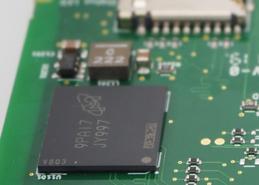Blog
Pengutronix auf dem ESE-Kongress
Auch der Embedded Software Engineering Kongress findet dieses Jahr online statt, und wir möchten die Chance nutzen, diesen als Event-Partner zu unterstützen, mit Leuten ins Gespräch zu kommen und gleichzeitig ein paar interessanten Vorträgen zu lauschen.
ELCE 2020 - Recommended Talks
The Embedded Linux Conference Europe (ELCE) is the one biggest meetup of Embedded Linux developers in Europe. As usual Pengutronix has attended this conference - but this year from the warmth of our homes.
eMMC Hardware Partitionierung
Wenn ein Embedded-System für eine lange Lebensdauer vorgesehen ist, ist es nötig, sich mit der Applikation und der darunter liegenden Hardware auseinanderzusetzen - damit beide zusammen eine hohe Langzeitstabilität erreichen.
Pengutronix auf der Embedded Linux Conference Europe
Das Programm der diesjährigen Embedded Linux Conference Europe (ELCE) wurde in den letzten Tagen veröffentlicht. Wie auch in den letzten Jahren beteiligt sich Pengutronix auch dieses Mal mit Vorträgen zu aktuellen Themen.
RAUC v1.4 Released
It's been 3 weeks ago now since the tag for RAUC 1.4 was created. But it is vacation time and so we have a good excuse for communicating things with some delay. Fortunately, the media team is back now and so also those of you who haven't noticed the new release yet will be informed about notable changes.
ELC-NA 2020 - A Virtual Experience
In 2020, things tend to be a bit different from what we had before. This is also true for this year's Embedded Linux Conference in North America. The need for keeping physical distance required the Linux Foundation to switch form a real conference to a fully virtual one.
RAUC v1.3 Released
Here it is, commit number 1700, 291 commits after the v1.2 tag: The v1.3 release of RAUC is out in the wild and adds a lot of new and useful features together with some fixes.
#FlattenTheCurve – Vorstellung unserer Remote-Infrastruktur
Die Corona-Krise hat uns alle, sowohl als Privatpersonen als auch als Firmen, plötzlich ziemlich hart getroffen und stellt unsere gesamte Gesellschaft vor neue Herausforderungen. Wir als Pengutronix möchten uns bei denjenigen bedanken, die in systemkritischen Berufen arbeiten und unsere alltägliche Versorgung sicherstellen.
Pengutronix at Embedded World 2020
Yesterday, Embedded World started, in normal times one of the largest trade shows for embedded development in Europe. While many exhibitors (and thus maybe also lots of visitors) have canceled their presence due to the coronavirus, we present our booth and our demo show cases as usual.
Fürchte nicht den offenen Quellcode - 1x1 des Lizenzmanagements
Computerprogramme und Code sind urheberrechtlich geschützt, in Deutschland lässt sich dieser Schutz nicht umgehen oder ausschalten. Das Urheberrecht gewährt grundsätzlich nur demjenigen, der das Werk geschaffen hat ("Urheber"), die Rechte an dem Werk. Mithin dürfte nur der Entwickler den von ihm geschriebenen Code verwenden, verändern und verbreiten.










